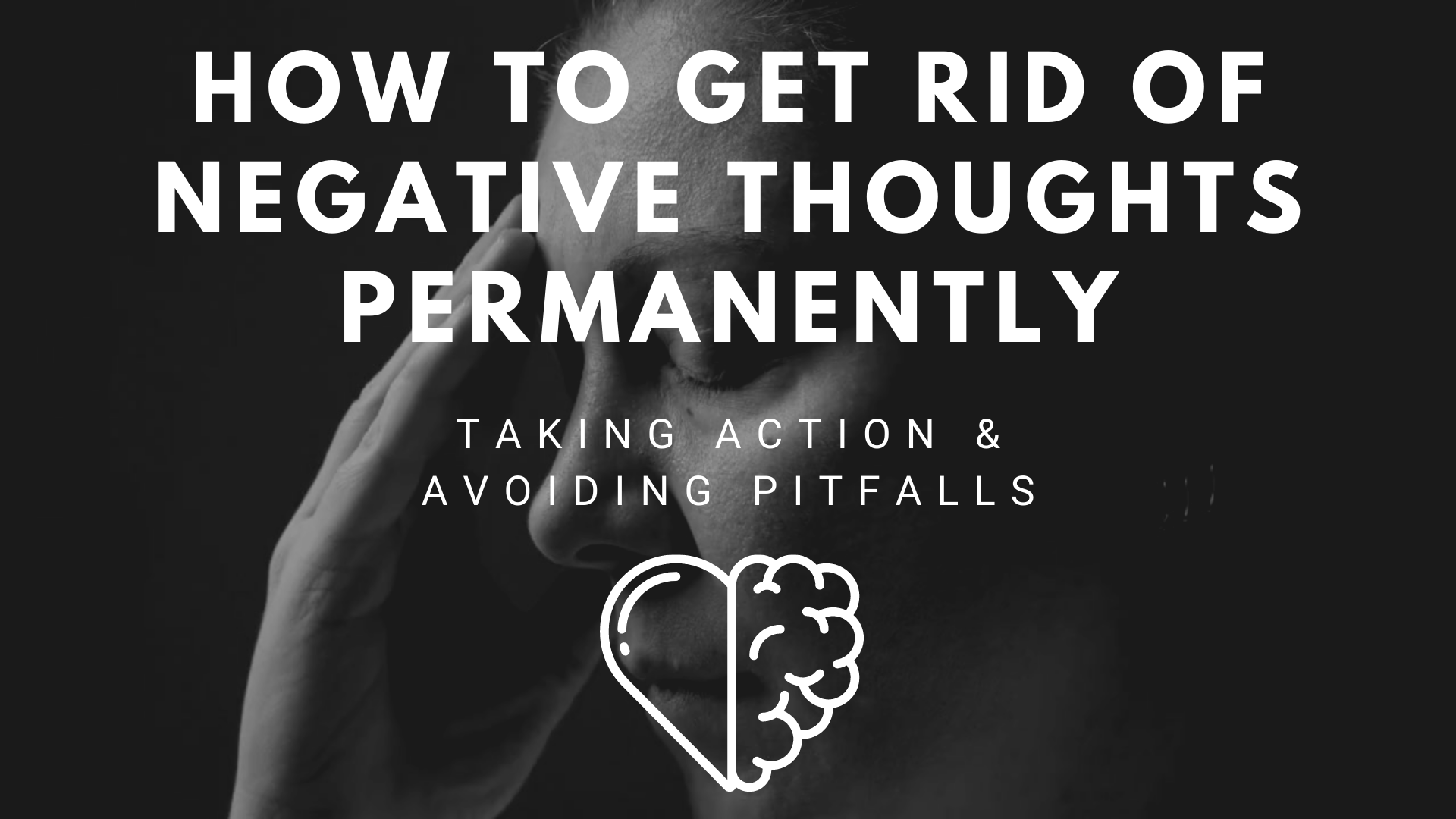How to remove negative thoughts from the mind permanently? This a question that appears in the minds of many, and I’m here to answer.
Negative thoughts or emotions pose a grave threat to our routine lives. These negative emotions and thoughts get latched to our brains, affecting our overall mental health in the process.
The repercussions of constantly dwelling on negative thoughts are serious. You need to address it and deploy defense mechanisms that might work for you. And believe me, defense mechanisms are not as complex as you might anticipate them to be.
Taking simple steps to ward off any negative, unwanted, or bad thoughts would go a long way.
How to Remove Negative Thoughts from Mind Permanently?

The human mind has evolved significantly. Our brain abstracts information intriguingly and uniquely.
Similarly, when a negative thought appears or pops up in our head, our immediate response is to find a way to dodge it or completely avoid it altogether.
However, avoiding negative thoughts is far more dangerous than you could imagine. Even a single negative thought that you have deceivingly submerged in your brain, will take its toll on your mind and overall mental health. Consequently, it will also start affecting your daily life in the long run.
You have to break the perception of avoiding your negative thoughts, and should start by addressing them, to remove them from your system, indefinitely. Here are some significant ways to help you get rid of negative and unwanted thoughts.
Addressing Your Critical Voice

As mentioned in McLean’s article on negative thinking, Dr. Coyne explains the phenomenon of hearing a critical voice in one’s head. She goes on to say that “people do not hear voices, per se.” Instead, we notice and witness critical thoughts that pop up in our heads, throughout the day.
“We have evolved to experience our thoughts as literal truth. It’s what allows us to learn indirectly by listening to what other people say, rather than only directly through our own experience,” she added.
Hence, this critical voice is always revolving around our brain and acts as an inner voice. This is the reason that you cannot simply put it off at will.
Therefore, you need to address your critical voice. Here are some ways you can do so:
- Identify the immediate threats and triggers of your critical or inner voice
- Track changes in behavior and notice when you first started to have these negative thoughts
- Open up and speak about the unwanted or negative thoughts going on in your head with a loved one
- Seek professional help and resound to therapy
- Replace the negative thoughts with something that immediately elevates your mood
- Take a break and detach yourself through deep breathing or meditation
- Commit to 10 minutes of Negative Thought Time (NTT) every day to gain control over them
Sometimes, addressing your critical voice may become cumbersome, given the cause of your negative thoughts.
However, it is unavoidable. And taking small steps is the way to go.
Even if you seek professional help and undergo therapeutic techniques like CBT (Cognitive Behavioral Therapy) and ACT (Acceptance and Commitment Therapy), the main catalyst is you, yourself. These techniques will only work, if you are proactive enough to drive the change process and overcome your fears, negative thoughts, and emotions, and take charge of your mental health.
Keeping Track of Intrusive Thoughts

As mentioned in the previous point, the human mind is designed to abstract and break down information. And when it comes to negative thoughts, the process is automatic.
A form of cognitive distortion, Automatic Negative Thoughts (ANTs) are immediate responses to certain situations, which usually involve decision-making. As soon as you are instructed or communicated something, the automatic negative thoughts kick or pop in, as an immediate response.
These thoughts are persistent and cannot be avoided. They are not simple to be removed – sometimes you will see a backlash of negative thoughts withing a few seconds.
Any intrusive or automatic negative thought needs to be tracked if you plan on getting rid of them indefinitely.
Take notes, keep track of all the negative thoughts that you encountered throughout the day, and create potential action items for them.
You can categorize the track record into the following parts:
- Background – Identify the situation revolving around the negative thought. Do this for every thought, so that you are aware of its context, every time you revisit your record.
- Present Moment or Mood – Recognize and point out your current state of mind against the identified background or situation. What does that situation make you feel now? This way you’ll know exactly how you feel. You can simply write keywords like fear, obsessive thinking, anxiety, stress, and vice versa.
- Immediate Image or Thought – The thought or image that immediately springs or pops up in your head, associated with that negative thought, you write that down. It will be easier for you to address that negative thought in this manner.
- Action Plan/ Items – Jot down and mention the potential action plans in your record, against every negative thought you have put together. You don’t need to overthink this. Simply write and mention action items that you like to indulge in. This could be your hobby like working out or reading. Taking a break or vacation or any meaningful action item that you think can help you overcome all the negative thoughts.
Here’s how you can piece it all together, using the following template (as an example):
| Description | Background/ Situation | Immediate Image/ Thought | Action Plan/ Items | |
| Negative Thought #1 | ||||
| Negative Thought #2 | ||||
| Negative Thought #3 |
This template can or may be changed, as per the individual’s preference or liking. In the end, the goal is to overcome negative thoughts in one’s mind permanently. And this will potentially serve as a toolkit to do so.
Practice Mindfulness and Become Your Own Best Friend

Mindfulness is all about self-awareness and knowing your existing circumstances. It requires you to be unbiased and focus primarily on the present.
As stated in an article at verywellmind, mindfulness requires you to be non-judgmental, prioritizing your present, rather than negating dwellings of the past and projection of the future.
This can only be achieved once you become your own best friend, and proactively fight to wear off your negative mindset.
Don’t let your thoughts be dictated by a person or your surroundings, be mindful, practice self-awareness, and bond with the person you see in the mirror.
Any negative thing that comes to your head, try overcoming it through mindfulness and self-reflection.
Your objective would be to gain command over your emotions by mapping your brain to accept negative thoughts and take them over through mindfulness and control.
Such practice of self-awareness will help you develop a positive mindset and help you to appreciate yourself, acting as a pathway towards getting rid of all negative thoughts and emotions from your mind permanently.
There are many related articles and studies promoting the concept of mindfulness and self-awareness to improve one’s mental health in the long run.
Here are some ways you can promote self-awareness and become your own best friend:
- Do not dwell on the past and let your emotions out with a positive outlook
- Give yourself some time and take a breather whenever and wherever necessary
- Learn to appreciate yourself for the good that you have done so far
- Practice mirror exercises by talking to yourself and feeling good about your journey and how far you’ve come
If you want to practice mindfulness in depth, I’d recommend reading the book Practicing Mindfulness by Matthew Sockolov.
Book Practicing MindfulnessIt will help you practice meditation, considering mindfulness, helping you get rid of negative thoughts in the long run.
See The Good in Everything

One of the ways you can elevate your mood and permanently get rid of negative thoughts from your mind is to see the good in everything.
While I understand that it’s easier said than done; however, once you put your focus on it, you’ll eventually start appreciating the good things, even under stressful situations.
Once you start to look at the positives, your stance on negative thoughts will change and start to subside.
You will notice that your negative thinking will fade away, once you look at the bigger picture, and simply be grateful for all the good.
Here are some tips on how you can see the good in everything:
- Surround Yourself with Positive People – this will allow you to have a positive mindset, fueled by the good thoughts, positive energy, and optimism of the people around you, which will eventually help you break that negative thought pattern. As opposed to having a negative person around you, if you surround yourself with positive people, they will help you to break that negative thinking thought process, remove any kind of negativity bias or negative belief that you might have in your head, and encourage positive thinking, helping you to see the greater good.
- Acknowledge Your Situation – this is extremely important and has been stressed throughout the article. You need to learn to acknowledge your situation, instead of putting any negative thoughts on trial. You need to work with your mind and redirect it to make you acknowledge your situation, trying to convert that negative emotion into a positive thought or emotion. If you want to see the good in everything, you first need to acknowledge what you’re going through and then determine the good or positives against any negative circumstance.
- Positive Affirmations – you need to reward yourself, simply through positive affirmations. These need not come from anyone else, but from yourself. Optimistic affirmations will help you break negative thinking patterns through self-motivation. For example, you may create a checklist on how to start the day, using statements like: “I will be present in every moment.” “I am smart.” “I am kind.” “I’m going to enjoy my day today.” Such affirmations will boost self-morale, help you get rid of any negative feelings, and obsessive thoughts, and focus on the positive ones instead.
- Appreciate the Little Things in Life – people often suffer from anxiety disorders and even depression, due to obsessive thinking and ongoing negative thoughts. However, sometimes, to bring positivity into your life and avoid any negative event, you need to have gratitude. Gratitude for all the little things in your life, like how good the coffee was today, the smile of a stranger, the weather, the scent of a flower that you just picked, and any other thing that makes you see and focus on the good around you. Sometimes, a little gratitude goes a long way and helps you to get rid of any immediate stress that you might face. Life is short. So, make sure to live your life to the fullest, by being grateful and appreciative of the little things around you.
Avoiding Pitfalls: Some Tips to Remember

You need to understand that negative thinking is common among everyone. Even the most positive of people must’ve encountered a negative thought in their mind at one time or the other.
Having said that, you cannot let your negative thoughts dictate your personality and most importantly, your mind/ brain.
In life, you’ll face numerous challenges and situations that are unpleasing to you. You’ll be surrounded by a plethora of different thoughts, with feelings of anxiety, stress, fear, and similar emotions.
However, you need to avoid the pitfalls and instead, overcome that situation.
These tips will help you to avoid pitfalls related to negative thoughts and negative thinking:
Don’t Overthink
One thing that ruins your state of mind is overthinking.
Overthinking tarnishes your mental health and if you keep dwelling on your negative thoughts by overthinking, your daily life will become adversely impacted.
Instead of constantly thinking about the perfect solution in every situation, try to comfort yourself.
Set a deadline.
Categorize your thoughts.
Don’t create clutter.
Avoid negative rumination.
Avoid Tunnel Vision
When you focus only on one aspect, in this case, negative thoughts, what you are doing is that you’re creating a tunnel vision.
Once you latch onto a negative thought, your mind will get fixated. And, instead of figuring out a solution or workaround, you’ll be trapped in a tunnel of constant stress and worry.
This is the reason why you should avoid tunneling your vision, and rather think holistically.
Create a bigger roadmap.
Don’t jump to conclusions.
Focus on the long run and the greater good.
Avoid Cynical Hospitality
Cynical hospitality happens when you start seeing other people as threats and react to them based on their angry mistrust of you.
You start to interpret other people’s behavior as intimidating, deceptive, and harmful for you, and always perceive others’ behavior as negative, believing that the individual, whether he or she is your friend or acquaintance, has an ulterior motive.
Take a pause.
Don’t let your judgmental thoughts overcome your life.
Try to think positively.
Know your faults.
Final Thoughts
Our mind encompasses many abilities.
As complex as the human brain is, only you can truly understand the context and functioning of your brain, simply because it’s your brain and mind.
Similarly, negative thoughts are part of your brain. In essence, they don’t even hold a fraction of our brain.
Sometimes we let our negative thoughts become embedded and seated inside our minds.
While I have tried to put together information to help you get rid of negative thoughts from your mind permanently, it is important to understand that you have the power to dictate your mental health.
Your effort to break the negative thinking pattern is just one step out of many.
Negative thoughts will keep coming in and you need to develop defense or coping mechanisms that work for you.




